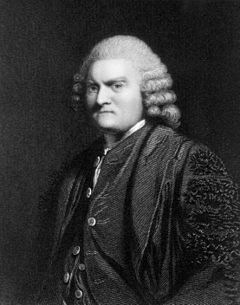Sir John Pringle
| Sir John Pringle, Bt | |
|---|---|

John Pringle
|
|
| Born | 10 April 1707 Stitchel, Roxburgh, Scotland |
| Died |
18 January 1782 (aged 74) London, England |
| Nationality | Scottish |
| Fields | physician |
| Alma mater | University of St Andrews |
| Known for | antiseptics |
| Notable awards | Copley Medal (1752) |
Sir John Pringle, 1st Baronet, PRS (10 April 1707 – 18 January 1782) was a Scottish physician who has been called the "father of military medicine" (although Ambroise Paré and Jonathan Letterman have also been accorded this sobriquet).
John Pringle was the youngest son of Sir John Pringle, 2nd Baronet, of Stichill, Roxburghshire (1662–1721), by his spouse Magdalen (d. December 1739), daughter of Sir Gilbert Elliot, of Stobs.
He was educated at St Andrews, at Edinburgh, and at Leiden. In 1730 he graduated with a degree of Doctor of Physic at the last-named university, where he was an intimate friend of Gerard van Swieten and Albrecht von Haller.
He settled in Edinburgh at first as a physician, but between 1733 and 1744 was also Professor of Moral Philosophy at Edinburgh University.
In 1742 he became physician to the Earl of Stair, then commanding the British army in Flanders. About the time of the battle of Dettingen in Bavaria in June 1743, when the British army was encamped at Aschaffenburg, Pringle, through the Earl of Stair, brought about an agreement with the Marshal of Noailles, the French commander, that military hospitals on both sides be considered as neutral, immune sanctuaries for the sick and wounded, and should be mutually protected. The International Red Cross, as constituted by the modern Geneva Conventions, developed from this conception and agreement.
...
Wikipedia
